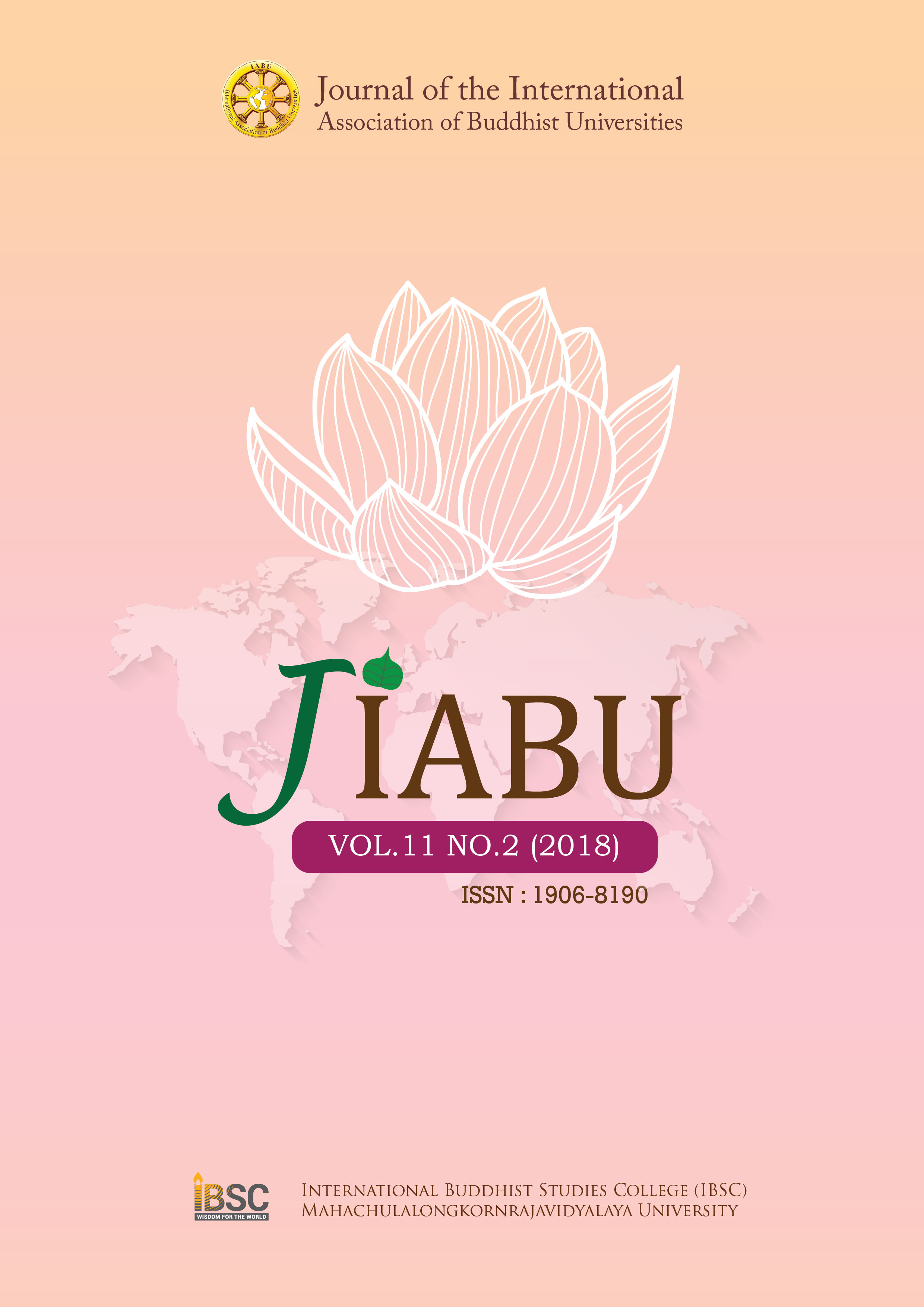Organ Donation after Death in Mahāyāna Buddhist Perspective
Main Article Content
Abstract
Nowadays lots of countries are encouraging organ donation after death. With the
global organ shortage, and the increasingly sophisticated organ-transplantation techniques,
this practice is becoming popular. In Buddhist circles, especially in today’s Buddhist circles
in Taiwan, there have been some Bhikkhu and Bhikkhunī who have been sparing no effort
to advocate organ donation after death. Meanwhile, there are also some Buddhist masters
who disagree or even oppose organ donation after death. Generally speaking, those who
advocate organ donation after death are keeping pace with the times by answering the
government’s call and are occupying the moral high ground. However, most of the Chinese
mainland Buddhist masters are still rather conservative about organ donation after death.
Actually, both the pros and cons of organ donation after death can fi nd their theoretical basis
recorded in the texts. This article is a research on organ donation after death in Mahāyāna
Buddhist perspective. There are three objectives of this article: (a) to study the belief of
organ donation (dāna) in Mahāyāna Buddhism; (b) to study the pros of organ donation after
death in Mahāyāna Buddhist perspective; and (c) to study the cons of organ donation after
death in Mahāyāna Buddhist perspective. This research examines two primary cruxes: (a)
the fi rst crux of organ donation after death involves the problematic criteria for death1; (b)
the second crux of organ donation after death involves different understanding of death and
how to take care of dying people.
Article Details
Views and opinions expressed in the articles published by The Journal of the International Association of Buddhist Universities (JIABU), are of responsibility by such authors but not the editors and do not necessarily reflect those of the editors.
References
Tripitaka V1.13 (Big5) Normalized Version CBETA V1.13 (Big5). Distributor:
Chinese Buddhist Electronic Text Association (CBETA). Release Date: 2009/04/
23. p.535 (T04, no.0208, p0535b05-p0535b16, p0531b25-p0531c24)
Taishō Tipiṭaka. Vol.25. No.1509 Da Zhi Du Lun, Chu Pin Shi Li Shi Lun Di San Shi Jiu.
CBETA Chinese Electronic Tripitaka V1.0 Normalized Version. Distributor:
Chinese Buddhist Electronic Text Association (CBETA). p. 238 (T25, no.1509,
p0238b15–p0238b27)
Taishō Tipiṭaka.Vol.02. No.100 Bie Yi Za A Han Jing Juan Di Ba (155). CBETA Chinese
Electronic Tripitaka V1.38 Normalized Version. Distributor: Chinese Buddhist
Electronic Text Association (CBETA). p.432 (T2, no.100, p0432b14–p0432b27)
Taishō Tipiṭaka.Vol.12. No.374 Mahāparinirvāṇa Sūtra. CBETA Chinese Electronic
Tripitaka V1.53 Normalized Version. Distributor: Chinese Buddhist Electronic
Text Association (CBETA). p.431 (T12, no.374, p0431b07–p0431b12)
Taishō Tipiṭaka. Vol.11. No.310 Da Bao Ji Jing Juan Di Jiu Shi, Yiu Po Li Hui Di Er Shi
Si. CBETA Chinese Electronic Tripitaka V1.42 Normalized Version. Distributor:
Chinese Buddhist Electronic Text Association (CBETA). p.515 (T11, no.310,
p0515c02–p0515c08)
Taishō Tipiṭaka.Vol. 2. No. 99 Za A Han Jing Juan Er Shi Yi. CBETA Chinese Electronic
Tripitaka V1.93 Normalized Version. Distributor: Chinese Buddhist Electronic
Text Association (CBETA). p.150 (T02, no.99, p0150b05–p0150b10)
Taishō Tipiṭaka.Vol.30. No.1579 Yogācārabhūmi-śāstra. CBETA Chinese Electronic
Tripitaka V1.93 Normalized Version. Distributor: Chinese Buddhist Electronic
Text Association (CBETA). p.505 (T30, no. 1579, p0505b02-p0510b25)
Taishō Tipiṭaka. Vol. 9. No. 262 Sad-dharma Puṇḍárīka Sūtra. CBETA Chinese
Electronic Tripitaka V1.93 Normalized Version. Distributor: Chinese Buddhist
Electronic Text Association (CBETA). p.53-54 (T09, no.0262, p0053a04-
p0054a12)
Taishō Tipiṭaka.Vol.50. No.2059 Biography of Eminent Monks. CBETA Chinese
Electronic Tripitaka V1.93 Normalized Version. Distributor: Chinese Buddhist
Electronic Text Association (CBETA). p.404-405 (T50, no.2059, p0404a02-
p0405c22)
Taishō Tipiṭaka. Vol.50. No.2060 A Sequel to Biography of Eminent Monks. CBETA
Chinese Electronic Tripitaka V1.93 Normalized Version. Distributor: Chinese
Buddhist Electronic Text Association (CBETA). p.678-684 (T50, no.2060,
p0678a15-p0684b03)
Taishō Tipiṭaka. Vol. 50. No. 2061 Biography of Eminent Monks in Song Dynasty.
CBETA Chinese Electronic Tripitaka V1.93 Normalized Version. Distributor:
Chinese Buddhist Electronic Text Association (CBETA). p.855-861 (T50,
no.2061, p0855a27-p0861c27)
Taishō Tipiṭaka. X77. No. 1524 An Additional Sequel to Biography of Eminent Monks.
CBETA Chinese Electronic Tripitaka V1.93 Normalized Version. Distributor:
Chinese Buddhist Electronic Text Association (CBETA). p.506-509 (X77,
no.1524, p0506b19-p0509b08)
Taishō Tipiṭaka. B27. No. 151 A New Sequel to Biography of Eminent Monks. CBETA
Chinese Electronic Tripitaka V1.93 Normalized Version. Distributor: Chinese
Buddhist Electronic Text Association (CBETA). p.301-306 (B27, no.0151,
p0301b14-p0306b25)
Taishō Tipiṭaka. T24. No. 1484 Brahmajāla-sūtra. CBETA Chinese Electronic Tripitaka
V1.93 Normalized Version. Distributor: Chinese Buddhist Electronic Text
Association (CBETA). p.1006 (T24, no.1484, p1006a16-p1006a25)
Taishō Tipiṭaka. T19. No. 945 Śūraṃgama-sūtra. CBETA Chinese Electronic Tripitaka
V1.93 Normalized Version. Distributor: Chinese Buddhist Electronic Text
Association (CBETA). p.132 (T19, no.0945, p0132b14-p0132b20)
Taishō Tipiṭaka. Vol. 54. No. 2125 Nan Hai Ji Gui Nei Fa Zhuan. CBETA Chinese
Electronic Tripitaka V1.93 Normalized Version. Distributor: Chinese Buddhist
Electronic Text Association (CBETA). p.231 (T54, no.2125, p0231a29–p0231c17)
Taishō Tipiṭaka. Vol.29. No.1558 Abhidharma-kośa. CBETA Chinese Electronic Tripitaka
V1.93 Normalized Version. Distributor: Chinese Buddhist Electronic Text
Association (CBETA). p.56 (T29, no.1558, p0056a17–p0056c23)
Bhikkuni Cheng Yen. Pure Wisdom (Qing Jing De Zhi Hui) [M]. Nan jing, China: Jiang
Su Ren Min Chu Ban She. 2009/1 Print.
Confucius. The Analects. Foreign Language Teaching and Studying Press. 1997 Print.
p.3-133.
Hisao Inagaki & Harold Stewart translated. The Three Pure Land Sutras. Numata Center
for Buddhist Translation and Research Press. 2003 Print. p.91.
Lingbo Yu. Analects for Verses Delineating the Eight Consciousnesses. Buddha’s
Education Foundation Press. 2009 Print. p.21.
Master Yin Guang.Yin Guang Da Shi Wen Chao Jing Hua Lu-Dharma Talk on End-of-Life. Beijing: Religion Press. 2006 Print. p. 61-66.
Tzu Chi. Tzu Chi USA Journal #44. Han Huang Press. 2015 Print. p.75.


